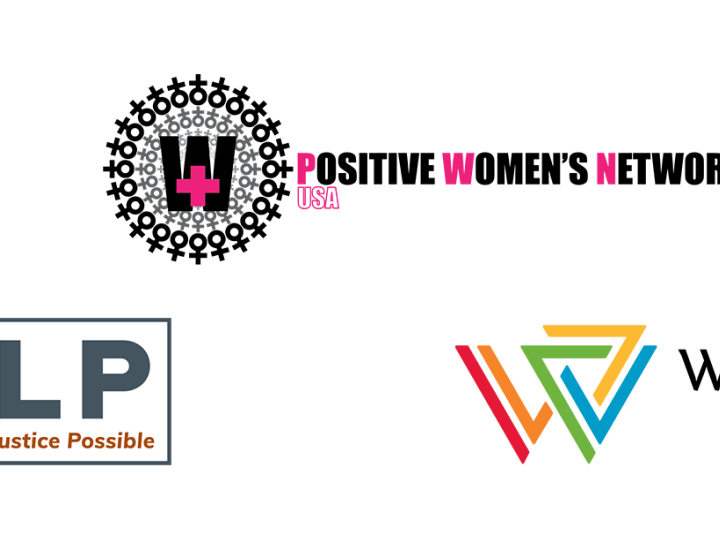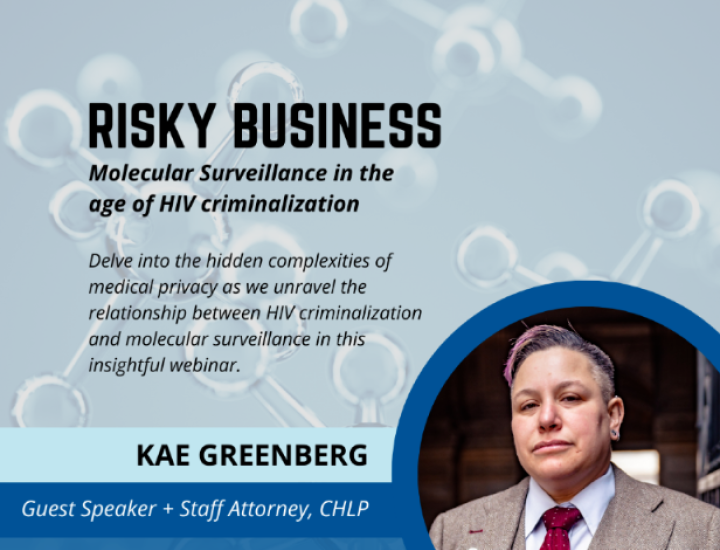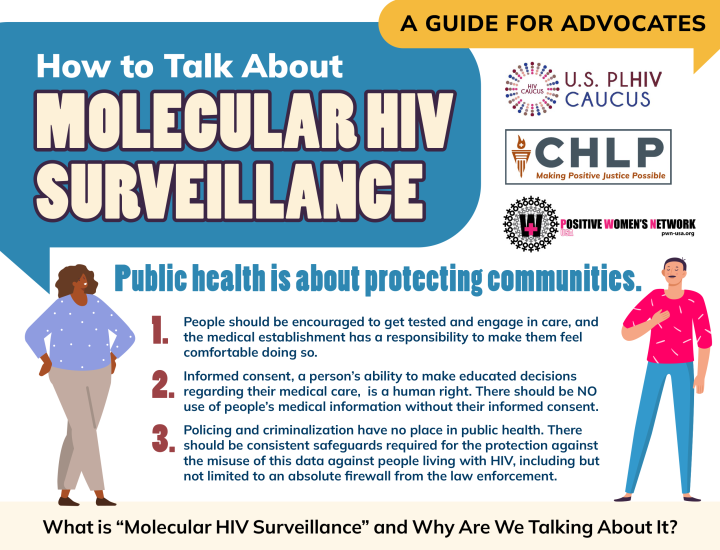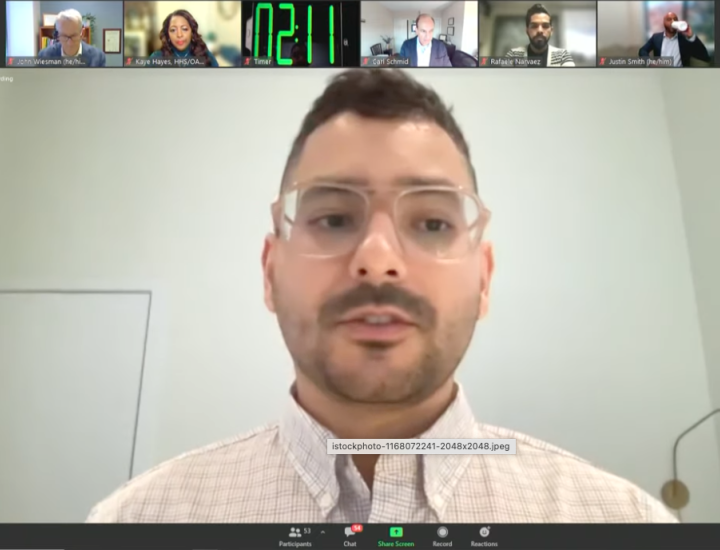News Release: Networks of People Living with HIV Petition CDC to be Involved in Determining Molecular HIV Surveillance Policy
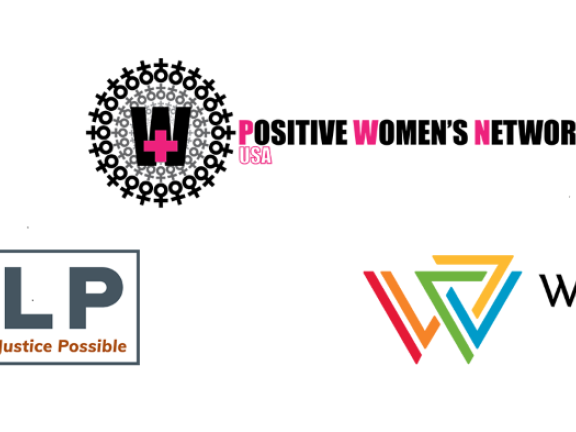

Networks of People Living with HIV Petition CDC to be Involved in Determining Molecular HIV Surveillance Policy
Letter to CDC marks the one-year anniversary of the passage of a resolution by the Presidential Advisory Council on HIV/AIDS demanding collaboration with people living with HIV
(NEW YORK) – Today, 110 networks of people living with HIV, and HIV and human rights organizations sent a letter to the Centers for Disease Control and Prevention’s (CDC) National Center for HIV, Viral Hepatitis, STD, and TB Prevention to demand they meet and meaningfully collaborate with the US People Living with HIV before the next iteration of Molecular HIV Surveillance and Cluster Detection and Response (MHS/CDR) policies.
Today, October 17, 2023 is the one-year anniversary of the adoption of the Presidential Advisory Council on HIV/AIDS (PACHA) MHS/CDR Resolution whose recommendations highlighted a key principle that has guided the HIV movement for 40 years: the Meaningful Involvement of People living with HIV/AIDS (MIPA).
Our letter calls out the harm caused by long-standing policies that compromise the fundamental rights of communities most affected by HIV, especially LGBTQ+ and Black, Indigenous, and People of Color. The letter asserts that due to the lack of MIPA in promulgating policies around MHS/CDR the CDC has only deepened the mistrust of the health system by people living with HIV. To ameliorate this, the CDC must meet and truly listen to and engage with the concerns of people living with HIV. This would represent a meaningful step forward in the fulfillment of its commitment to ending the HIV epidemic.
“Listening sessions are not enough,” said Naina Khanna, co-executive director of Positive Women’s Network-USA and a member of the U.S. People Living with HIV Caucus. “We are demanding meaningful change to federal MHS/CDR policies to protect human rights for overpoliced communities in a time of rising dangers. Concerns about the collateral consequences of cluster detection and response including threats to health data privacy and security, lack of informed consent, legal and material consequences of HIV stigma and criminalization, and the misinvestment of resources that could be better used to address racial inequities in the HIV epidemic have been well documented in the US and globally. It’s long past time for the CDC to come to the table with people living with HIV to make the changes that have consistently been recommended by human rights experts.”
“Ending the HIV epidemic is not possible without meaningful and actively engaging leadership from people living with HIV,” said Martha Sichone-Cameron, co-chair of the US People Living with HIV Caucus. “Structural MIPA requires giving PLHIV networks a real voice in the planning, implementation and evaluation of programs that impact us and our communities. We need and deserve no less.”
“More and more, public health institutions seem to have given up on meaningful community partnerships with people living with HIV and focused on their own power and expertise,” asserts Dr. Andrew Spieldenner, Executive Director of MPact Global Action, “but we have seen the limits of this approach. It’s a shame that expedience has overwritten long-standing partnerships.”
“It is a well-established principle of public health practice that the communities most impacted must be centered,” said Dr. Kellan E. Baker, Executive Director and Chief Learning Officer of Whitman-Walker Institute. “This letter reminds public health authorities that they have an obligation to partner with the ready and willing networks of people living with HIV in the fight to end the HIV epidemic.”
“A year ago, our nation’s highest federal HIV policy advisory body urged the CDC to protect the human rights, bodily autonomy, and public health data privacy of PLHIV,” said Amir Sadeghi, Policy and Advocacy Manager, CHLP. “By mandating molecular HIV surveillance for all US jurisdictions without any buy-in or engagement from the leading national and local membership organizations formed by PLHIV, the CDC made a significant mistake that erodes trust in public health. Bodily autonomy, informed consent, and key protections to prohibit the use of any and all health data in criminal prosecutions against PLHIV are not at odds with public health–they are the anchors that make public health in alignment with ethics, trust, and human dignity.”
The letter has been endorsed by the following organizations:
Advocates for Youth
AIDS Action Baltimore
AIDS Alabama
AIDS Alabama South
AIDS Foundation Chicago
AIDS United
All Under One Roof LGBT Advocates of SE Idaho
Alyssa Rodriguez Center for Gender Justice
American Academy of HIV Medicine (AAHIVM)
APLA Health
Appalachian Learning Initiative
Arkansas RAPPS
AVAC
Best Practices Policy Project
Black & Pink National
Blanc Slate Firm
Caracole, Inc.
Cascade AIDS Project
Center for Health Law and Policy Innovation (CHLPI)
Central Illinois Friends
CHANGE New Orleans
Chicago Women's AIDS Project
CHLP
Colorado Organizations and Individuals Responding to HIV/AIDS (CORA)
Community Solutions
Contigo Fund
Desiree Alliance
Equality Federation
Family Service of Greater Baton Rouge
Five Horizons Health Services
Freedom Oklahoma
Frontline Legal Services
Galaei
Garden State Equality
Georgia Equality
GMHC
GoodWorks: North AL Harm Reduction
Health Not Prisons Collective
Health and Education Alternatives for Teens (H.E.A.T.), SUNY Downstate
HIV Modernization Movement-Indiana
HOPE Cape Town USA
Horizon Ridge Wellness Clinic, Inc.
Idaho Coalition For HIV Health and Safety
International Community of Women Living with HIV
Just B U Inc.
Lambda Legal
Legacy Community Health
Legal Action Center
Lilmesican Productions, Inc. - A Social Enterprise
Louisiana AIDS Advocacy Network
Louisiana Coalition on Criminalization and Health
Michael Reese Research and Education Foundation
Minority Health Consultants
Movimiento en Respuesta al VIH Inc.
NAESM, Inc.
National Alliance for HIV Education and Workforce Development (NAHEWD)
National Harm Reduction Coalition
National Working Positive Coalition
New Haven Mayor's Task Force on AIDS
New Orleans Advocates for LGBTQ+ Elders (NOAGE)
NEW Pride Agenda
National HIV and Aging Advocacy Network (NHAAN)
NMAC
North Carolina AIDS Action Network (NCAAN)
Ohio Health Modernization Movement
OnePULSE Foundation, Inc.
PA-HIV Justice Alliance
Positive People Network Inc.
Positive Women’s Network-New York chapter
Positive Women's Network-Pennsylvania chapter
Positive Women’s Network-South Carolina chapter
Positive Women's Network-USA (national)
Positively U
Proactive Community Services
QLatinx
Rural Women's Health Project
SAGE
San Francisco AIDS Foundation
SEEDS of Healing, Inc.
Sero Project
SOMOS LOUD, Central FL Chapter
Southern AIDS Coalition
Strategies for High Impact
SWOP Behind Bars
T2Q Trans Quantum Questioning LLC
Tennessee HIV Modernization Coalition
The Black Cave
The Bros in Convo Initiative
The Counter Narrative Project (CNP)
The New Pride Agenda
The Reunion Project
The Sankofa HIV Initiative
The Well Project
Thrive Alabama
THRIVE SS, Inc.
Transgender Law Center
Transgender Legal Defense & Education Fund
TransProgram
Treatment Action Group
Unique & Unified New Era Youth Movement
Unity Fellowship of Christ Church NYC
US People Living with HIV Caucus
Vivent Health
VOCAL-NY
We the Positive / My Brother's Keeper
Western North Carolina AIDS Project
Whitman-Walker Institute
William Way LGBT Community Center
Woman to Woman We Are One
Women With A Vision
